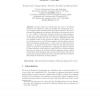Free Online Productivity Tools
i2Speak
i2Symbol
i2OCR
iTex2Img
iWeb2Print
iWeb2Shot
i2Type
iPdf2Split
iPdf2Merge
i2Bopomofo
i2Arabic
i2Style
i2Image
i2PDF
iLatex2Rtf
Sci2ools
111
click to vote
INDOCRYPT
2004
Springer
2004
Springer
New ID-Based Threshold Signature Scheme from Bilinear Pairings
ID-based public key systems allow the user to use his/her identity as the public key, which can simplify key management procedure compared with CA-based public key systems. However, there is an inherent disadvantage in such systems: the problem of private key escrow, i.e., the “trusted” Private Key Generator (PKG) can easily impersonate any user at any time without being detected. Although the problem of escrowing the private key may be reduced by distributing the trust onto multiple centers, it will decrease the efficiency of the systems. Chen et al. first proposed a novel ID-based signature scheme without trusted PKG from bilinear pairings [10], i.e., there is only one PKG who is not assumed to be honest in their scheme. However, the signature scheme cannot be extended to a threshold one. In this paper we propose another ID-based signature scheme without trusted PKG from bilinear pairings. Moreover, we propose an ID-based threshold signature scheme without trusted PKG, which sim...
Related Content
| Added | 02 Jul 2010 |
| Updated | 02 Jul 2010 |
| Type | Conference |
| Year | 2004 |
| Where | INDOCRYPT |
| Authors | Xiaofeng Chen, Fangguo Zhang, Divyan M. Konidala, Kwangjo Kim |
Comments (0)

